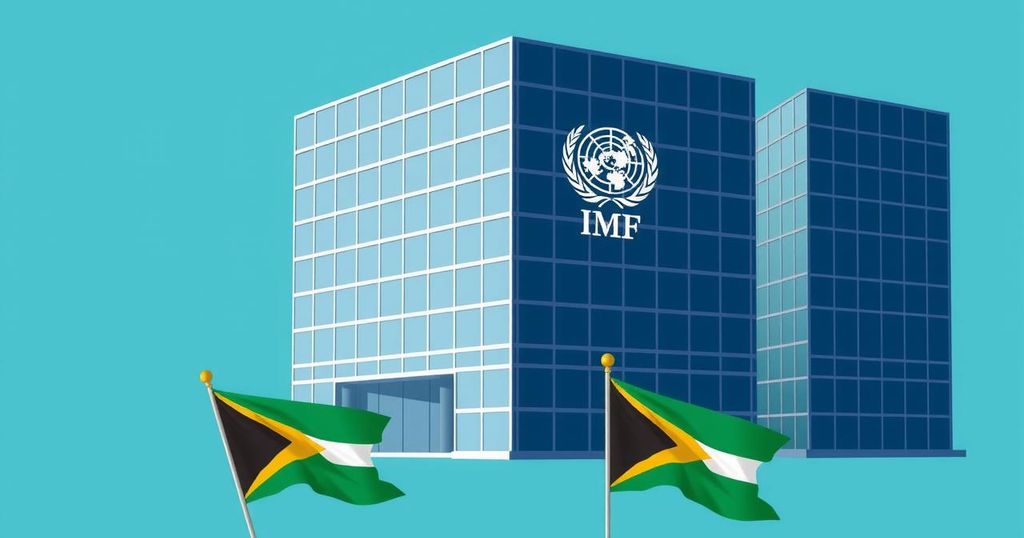The IMF staff and Suriname have reached a staff-level agreement on the final review under the Extended Fund Facility. Pending Executive Board approval, Suriname could access approximately USD 61.3 million. The economic program has successfully achieved its objectives, including growth and investor confidence, while maintaining a focus on fiscal discipline and governance improvements.
The International Monetary Fund (IMF) staff and Surinamese authorities have reached a staff-level agreement on the ninth and final review of Suriname’s economic recovery program, which is backed by the Extended Fund Facility (EFF). This agreement, pending approval by the IMF’s Executive Board, would enable Suriname to access approximately USD 61.3 million (SDR 46.8 million) as a result of successful program adjustments.
The objectives of the economic program have largely been met, with Suriname experiencing economic growth, decreasing inflation, and a reduction in public debt. Importantly, the autonomy and governance of the central bank have improved, leading to a resurgence in investor confidence. The authorities prioritize maintaining fiscal discipline ahead of upcoming elections while ensuring support for vulnerable populations.
In the medium term, the government aims to address governance weaknesses while establishing a robust fiscal framework that includes new fiscal rules to manage oil revenues sustainably and transparently. An IMF team, led by Ms. Anastasia Guscina, conducted discussions from February 5 to February 14 regarding the final review of the EFF, which was approved in December 2021.
Ms. Guscina noted that while all quantitative targets were met for the final review, the primary fiscal balance target was not achieved. Plans are in place to ensure that the target of a 2.7 percent primary surplus of GDP for 2025 remains attainable. Suriname has reported a projected growth of 3 percent for this year and a notable decline in inflation. Furthermore, the country has witnessed an increase in donor support, returning investor confidence, and comfortable levels of international reserves.
The fiscal discipline remains a priority, despite missing the end-December primary balance target primarily due to factors such as underperforming non-tax revenues and overspending on electricity subsidies. The government continues to support sectors such as agricultural farmers affected by adverse weather conditions. Recent legislation aimed at enhancing public financial management will facilitate improved management of forthcoming oil revenues.
Protecting vulnerable populations continues to be paramount, with the government exceeding targets for social assistance spending. Significant social spending has increased, although execution challenges remain, particularly in rural areas. The authorities are urged to implement the strategic plan recently developed to improve social assistance effectiveness, alongside support from development partners.
Completing debt restructuring has contributed to enhancing investor confidence, with agreements in place for negotiations with creditors. Recent upgrades from credit rating agencies and decreased international bond spreads reflect Suriname’s improved financial standing. Additionally, the Central Bank of Suriname’s restrictive monetary policy has contributed to reduced inflation.
The Central Bank has met all monetary targets for this final review and remains dedicated to a flexible exchange rate strategy while improving the functioning of the foreign exchange market. Vital efforts are underway to address vulnerabilities within the banking sector, including capital monitoring and adequate liquidity measures.
The government must advance structural reforms to reinforce institutions and enhance governance, particularly regarding anti-corruption measures and transparency concerning public officials’ asset holdings. The IMF mission expressed gratitude to Surinamese authorities for their collaboration, engaging with high-level officials across the government, civil society, and the private sector throughout the discussions.
The IMF’s staff-level agreement with Suriname represents a significant achievement in the nation’s economic recovery program, subject to the Executive Board’s approval. The focus on fiscal discipline, governance enhancement, and social protection underscores the government’s commitment to sustainable development. As Suriname prepares for increased oil revenues, successful implementation of reforms will be critical to maintaining fiscal stability and fostering lasting economic growth.
Original Source: www.miragenews.com




